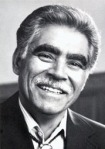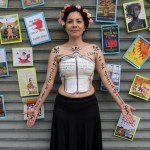October has arrived, and cooler temperatures mean a better excuse to curl up with a good book. Here’s what going on in the world of Latino literature:
• Already out: Gwendolyn Zepeda’s newest book is a collection of poetry, Falling in Love with Fellow Prisoners, that details her life in the city. In the children’s book Parrots Over Puerto Rico, authors Susan L. Roth and Cindy Trumbore connect the bird with the island’s history.
 • Oct. 1: Kami Garcia’s Unbreakable, which is aimed at readers ages 12 and older, features a young girl who is haunted by paranormal activity.
• Oct. 1: Kami Garcia’s Unbreakable, which is aimed at readers ages 12 and older, features a young girl who is haunted by paranormal activity.
• Oct. 3: Darling: A Spiritual Autobiography finds Richard Rodriguez exploring the role of religion in the world.
 • Oct. 22: Xavier Garza’s newest children’s book is Maximilian & the Bingo Rematch: A Lucha Libre Sequel (Max’s Lucha Libre Adventures), in which a sixth-grader faces several challenges in life and love.
• Oct. 22: Xavier Garza’s newest children’s book is Maximilian & the Bingo Rematch: A Lucha Libre Sequel (Max’s Lucha Libre Adventures), in which a sixth-grader faces several challenges in life and love.
• Oct. 31: In Daniel Alarcón’s At Night We Walk in Circles, a young man touring with a political acting troupe finds himself caught up in his own personal drama.
Literary magazines:
• The third edition of Huizache, the literary magazine produced by the University of Houston-Victoria’s Center for Mexican American Literature and Culture, comes out Oct. 15. The issue will include works by Cristina García, Juan Felipe Herrera, Domingo Martinez and Héctor Tobar. The $15 issue can be ordered online.
Book Festivals:
• Oct. 5: Librofest in Houston features Sarah Cortez, Guadalupe Garcia McCall, Manuel Ramos, René Saldaña Jr. and Gwendolyn Zepeda.
• Oct. 26-27: The Texas Book Festival in Austin includes Monica Brown, Alfredo Corchado, Matt de la Peña, Cristina García, Kami Garcia, Xavier Garza, Manuel Gonzales, Duncan Tonatiuh and Mario Alberto Zambrano.
Writing contests:
• The National Association for Chicana and Chicano Studies—Tejas Foco is sponsoring two contests for writers who have published fiction in 2013 that relate to the Mexican American experience in Texas. Deadline is Dec. 3.
• The new Angela Johnson Scholarship from the Vermont College of Fine Arts will offer $5,000 to writers of color pursuing the school’s master’s degree in Writing for Children & Young Adults.
• Colombian writer Alvaro Mutis, left, the winner of the Cervantes Prize, passed away last month at age 90. Here’s his obituary from the Associated Press, via the Huffington Post; a remembrance from The Guardian; and an 2001 interview with Francisco Goldman from the Bombsite website.
 • Poet and artist Jose Montoya, a former poet laureate for the city of Sacramento, passed away last month at age 81. The Modesto Bee had a obituary, while the Sacramento Bee featured a photo gallery and an editorial.
• Poet and artist Jose Montoya, a former poet laureate for the city of Sacramento, passed away last month at age 81. The Modesto Bee had a obituary, while the Sacramento Bee featured a photo gallery and an editorial.
• The Los Angeles Times ran an obituary for Bea Franco, the woman who inspired “The Mexican Girl” character in Jack Kerouac’s On the Road and the new Tim Z. Hernandez novel Mañana Means Heaven.
 • Isabel Allende, whose most recent novel is Maya’s Notebook, talked to The Guardian about her family and her past.
• Isabel Allende, whose most recent novel is Maya’s Notebook, talked to The Guardian about her family and her past.
• NBC Latino profiled Monica Brown, author of Marisol Mcdonald and the Clash Bash/Marisol Mcdonald Y La Fiesta Sin Igual.
 • Junot Díaz, whose latest book This is How You Lose Her comes out Oct. 31 in a paperback deluxe edition with illustrations by Jaime Hernandez, has been featured in the Associated Press, Esquire and Salon. He also spoke to NBC Cafecito about his work with Freedom University for undocumented students.
• Junot Díaz, whose latest book This is How You Lose Her comes out Oct. 31 in a paperback deluxe edition with illustrations by Jaime Hernandez, has been featured in the Associated Press, Esquire and Salon. He also spoke to NBC Cafecito about his work with Freedom University for undocumented students.
 • Poet and novelist Gary Soto wrote in the Huffington Post about why he stopped writing children’s stories.
• Poet and novelist Gary Soto wrote in the Huffington Post about why he stopped writing children’s stories.
• Novelist Alisa Valdes, left, gave her views on contemporary Latino lit to NBC Latino.
• Juan Pablo Villalobos, author of Down the Rabbit Hole, was featured in the latest Granta podcast.
• Mario Alberto Zambrano discussed his book Lotería to the Village Voice.
 • The Cristina García novel Dreaming in Cuban was banned by an Arizona school, according to the Colorlines website. Meg Medina faced problems at one school with her book, Yaqui Delgado Wants to Kick Your Ass.
• The Cristina García novel Dreaming in Cuban was banned by an Arizona school, according to the Colorlines website. Meg Medina faced problems at one school with her book, Yaqui Delgado Wants to Kick Your Ass.
• Here’s a cool way to celebrate Hispanic Heritage Month, which ends Oct. 15 — this literary flow chart from ebook publisher Open Road Media shows great Latino literature selections.
• Publishing Perspectives examined how ebooks were affecting libraries in the Spanish-speaking countries.
Also this month:
• Looking for books for Halloween? Check out these scary stories for children and these thrillers for adults.








































